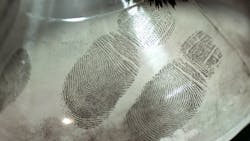Fingerprints or DNA which is more effective in case? As someone who has worked in the crime scene investigation field, this is a question that has been posed to me more than once. The increase in scientific findings regarding DNA have broadened the capabilities for forensic scientists as well as investigators. Cases with little to know evidence that have remained cold for decades are now reopened with the hope of solving the crime through DNA analysis. The amazing fact about DNA is that it takes very little to create enough of a profile to match to strands that are already in the CODIS database. The other part of that is there are different ways of testing DNA such as familial DNA testing which has come in extremely useful in cases that have been sitting cold for many years.
Fingerprints still have their place as well. The science of fingerprints was first developed in China around during the BC era. This method gained popularity in Europe around the 1700s and J. Edgar Hoover implemented the use of fingerprint detection into the FBI for the United States. Since no human being has the same fingerprint, each one is a map of it's own revealing unique traits. If a good print is found at a crime scene it may be photographed (well) and/or lifted in order to compare through the national database.
There are some instances when fingerprints and DNA are both used in order to identify an individual. If done properly, one can lift a latent print for comparison, yet still collect DNA from that surface.
So what is the answer to the question? They both have their place and can be equally effective. It all depends on the case.

Hilary Rodela
Hilary Rodela is currently a Surveillance Officer, a former Private Investigator, a former Crime Scene Investigator, and Evidence Technician. She worked for the Ruidoso (NM) Police Department as well as the Lubbock (TX) Police Department. She has written for several public safety publications and has extensive law enforcement and forensic training and is pursuing forensic expertise in various disciplines. Hilary is a freelance public safety writer and curriculum developer for the National Investigative Training Academy.



